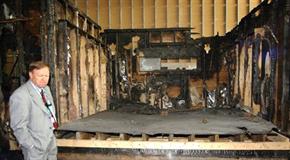Features
Relics From RI Club Fire Near End Of Useful Life
More than 700 artifacts were collected from the burned-out wreckage of The Station and were saved in the warehouse so lawyers for survivors and victims’ relatives could determine what materials contributed to the fire’s lightning-quick spread, identify responsible manufacturers and decide who should be sued.

Now, with those lawsuits settled, the warehouse appears on its way to becoming obsolete.
Each of the several dozen people and companies sued after the blaze has offered to settle for a total of $176 million, avoiding a trial. A judge signed off on the settlements last month, though no money has been paid to the more than 300 plaintiffs.
Lawyers haven’t detailed their plans for the warehouse, saying they’ll take it up once the case officially concludes and the families receive their money. But the most likely outcome is that the warehouse will ultimately be vacated and the materials somehow disposed of, though how any of that would happen hasn’t been decided.
“The last thing we want to see is artifacts from that warehouse be on eBay or some crazy thing like that,” said Michael St. Pierre, a lawyer for some of the victims. “I think that would be very detrimental to the memory of those who lost their lives and those who got injured.”
Though at least one survivor says he’s curious to see what’s in the warehouse, some victims’ relatives say there’s nothing sentimental or comforting about anything from the club.
Chris Fontaine lost her 22-year-old son, Mark Fontaine, and is president of the Station Fire Memorial Foundation. She said the foundation was asked whether it wanted any of the artifacts for a permanent memorial envisioned for the roadside fire site. The answer was no.
“The memorial is going to be built with the intention to have a nice, peaceful, garden-like atmosphere,” Fontaine said. “We don’t need more gruesome type of reminders of what happened at that place.”
The Feb. 20, 2003, fire at the West Warwick nightclub began when pyrotechnics used as a stage prop by the rock band Great White set ablaze cheap foam used as soundproofing around the stage. Besides the 100 people killed, more than 200 were injured.
State authorities scoured the site for evidence of criminal misconduct, but lawyers for the victims cast a wider net in tagging and preserving any item they thought might be useful for lawsuits.
Lawyers for the plaintiffs and the defendants have shared the cost of a rented 4,000-square-foot warehouse in Cranston, a few miles from West Warwick. They reassembled what was left of the stage in the larger of the two rooms and reconstructed the drummer’s alcove, where the fire was believed to have started and where flammable insulation was found.
They also saved insulation suspected of fanning the flames, the club’s tiled front walkway and red carpet, pool table coverings, charred debris, burned-out drums and other blackened fixtures that carried the odor of the smoke and flames.
The warehouse is locked to the public and overseen by a federal judge, with access generally limited to lawyers for the victims or defendants.
In a separate criminal case, club owners Jeffrey and Michael Derderian pleaded no contest to 100 counts of involuntary manslaughter, admitting they installed the flammable soundproofing foam. Biechele pleaded guilty to the same charges for igniting the pyrotechnics without a permit.

Michael Derderian and Biechele served time in prison; Jeff Derderian didn’t.
Ultimately, dozens of people and other entities including foam manufacturers, a brewing company and the state were sued in a mass negligence case, which settled in piecemeal fashion in 2007 and 2008.
Mark Mandell, another lawyer for victims, told a judge last week that the warehouse won’t be dealt with until the clients receive their settlements, which could start happening in months.
“We can’t lose that valuable evidence,” Mandell said. “That’ll be the last step, as far as we see, to deal with the warehouse.”
Drummer Al Prudhomme, who played for the rock band Fathead, which opened for Great White the night of the fire, said he’s curious about what’s in the warehouse, especially since he lost about $5,000 worth of musical equipment in the blaze.
He displays in his basement autographs and photos of 1980s heavy metal stars he’s met and says he wouldn’t mind adding mementoes from The Station to that collection.
“It would bring back a weird, funny, kind of bad feeling,” he said, “but in the same token, it’s just like people who want to recover things from the Titanic – the few people that were alive.”
Dave Kane, whose 18-year-old son, Nicholas O’Neill, was the youngest fire victim, said he had no interest in the warehouse. But Kane, who has persistently criticized the lackluster inspections of the club before the fire and the decision to indict only three people, offered one tongue-in-cheek solution for the warehouse and its artifacts:
“Why don’t they make it a museum to the incompetence of government?” he asked. “And they could have all the results of all the people who didn’t do their jobs.”